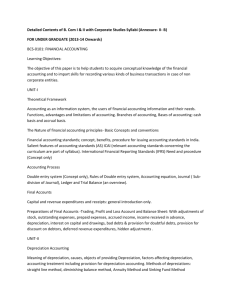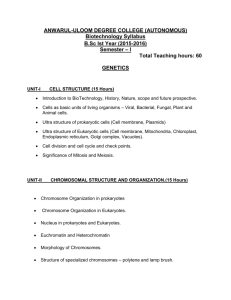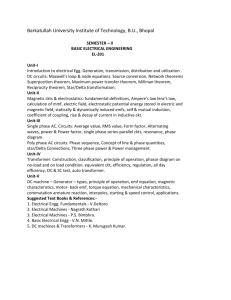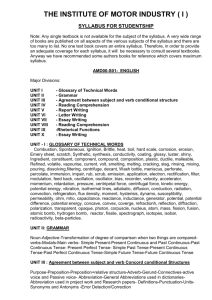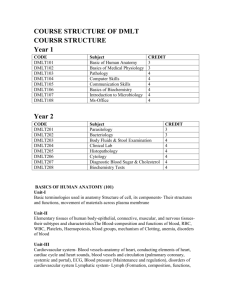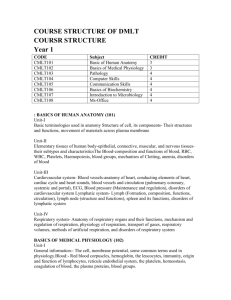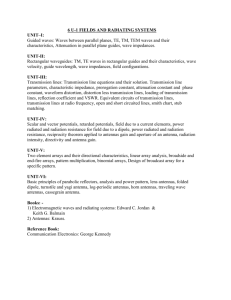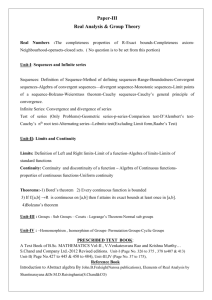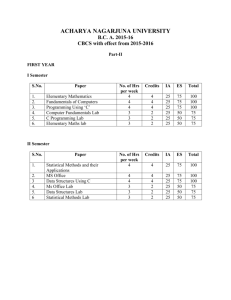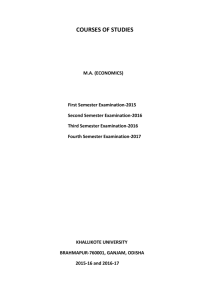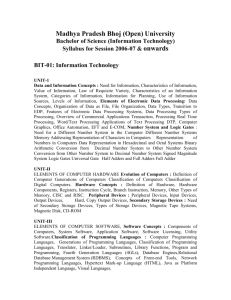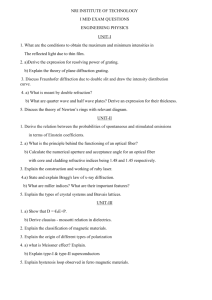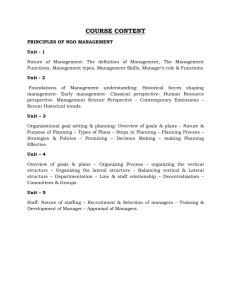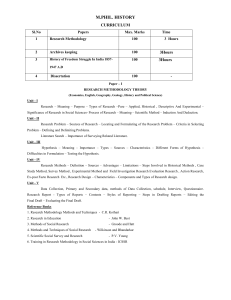Syllabus-of-BCOM
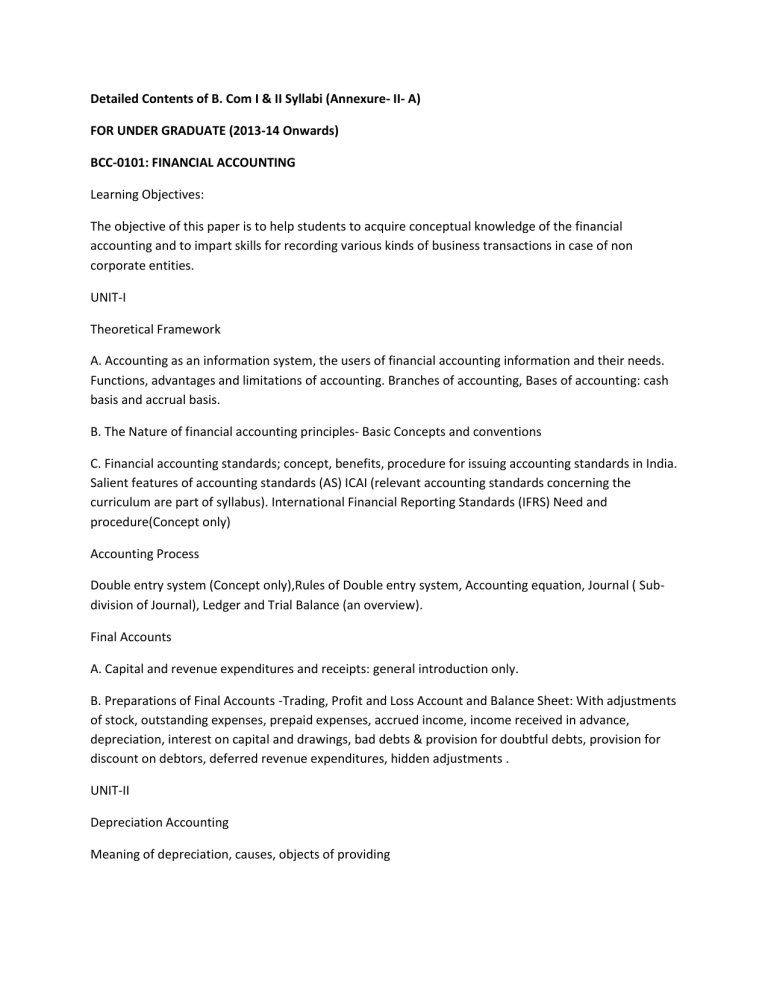
Detailed Contents of B. Com I & II Syllabi (Annexure- II- A)
FOR UNDER GRADUATE (2013-14 Onwards)
BCC-0101: FINANCIAL ACCOUNTING
Learning Objectives:
The objective of this paper is to help students to acquire conceptual knowledge of the financial accounting and to impart skills for recording various kinds of business transactions in case of non corporate entities.
UNIT-I
Theoretical Framework
A. Accounting as an information system, the users of financial accounting information and their needs.
Functions, advantages and limitations of accounting. Branches of accounting, Bases of accounting: cash basis and accrual basis.
B. The Nature of financial accounting principles- Basic Concepts and conventions
C. Financial accounting standards; concept, benefits, procedure for issuing accounting standards in India.
Salient features of accounting standards (AS) ICAI (relevant accounting standards concerning the curriculum are part of syllabus). International Financial Reporting Standards (IFRS) Need and procedure(Concept only)
Accounting Process
Double entry system (Concept only),Rules of Double entry system, Accounting equation, Journal ( Subdivision of Journal), Ledger and Trial Balance (an overview).
Final Accounts
A. Capital and revenue expenditures and receipts: general introduction only.
B. Preparations of Final Accounts -Trading, Profit and Loss Account and Balance Sheet: With adjustments of stock, outstanding expenses, prepaid expenses, accrued income, income received in advance, depreciation, interest on capital and drawings, bad debts & provision for doubtful debts, provision for discount on debtors, deferred revenue expenditures, hidden adjustments .
UNIT-II
Depreciation Accounting
Meaning of depreciation, causes, objects of providing
Depreciation, factors affecting depreciation, accounting treatment including provision for depreciation accounting. Methods of depreciations: straight line method, diminishing balance method, Annuity
Method and Sinking Fund Method
Accounting for special sales transaction Consignment: Basic features; difference with sales. Recording in the books of Consignor – at cost & at invoice price, Valuation of unsold stock; Ordinary commission.
Treatment and valuation of abnormal & normal loss. Special commission; Del credere commission.
Recording in the books of Consignee.
UNIT-III
Accounting for inland branches and Departmental accounts Concept of dependent branches only; accounting aspects; ascertainment of profit by debtors’ method and stock and debtors method. Concept of Departmental Accounts, objective of preparation of departmental accounts, apportionment of common cost; Preparation of Departmental Trading and P/L account.
UNIT-IV
Accounting for dissolution of the partnership firm Accounting for simple dissolution. Application of rule
(Garner v/s Murray) in case of insolvency of partner(s) excluding piecemeal distribution and sale of a firm to a company) Accounts of Non Trading Organisations Receipt and Payment Account, Income and
Expenditure Account, Balance Sheet, Conversion of Income and Expenditure Account into Receipt and
Payment Account, Conversion of Receipt and Payment Account into Income and Expenditure Account.
(Simple Application) (Theory and Problems may be in the ratio of 40% and 60% respectively).
BCC-0102: BUSINESS COMMUNICATION AND PERSONALITY DEVELOPMENT
Learning Objectives: To train students to enhance their skills in written as well as oral Communication through practical conduct of this course and to help them to develop their personality. This course will help students in understanding the principles & techniques of business communication and Personality
Development.
UNIT-I
Basics of Communication Meaning, Nature, Importance and Role of Communication; The
Communication Process; Barriers and Gateways to Communication, Ethical and Legal issues in communication. Written Communication: Principles of Effective Written Communication; Business
Letters, Report Writing, Speech Writing, Preparing Minutes of Meetings; Notice, Agenda, Proposal writing.
UNIT-II
Applications of Communication Secretarial: Correspondence with shareholders and debenture holders relating to dividends and interest, transfer and transmission.
Inter- Departmental Communication: Internal memos, office circulars, office orders, office notes.
Communication with regional and branch offices.
UNIT-II
Trait Personification/ Personality Traits Pillars of Personality Development Introspection – Self
Assessment – Self Appraisal – Self Development- Self Introduction. Self Esteem Term of self esteem- symptoms- advantages- Do’s and don’ts to develop positive – Positive self esteem & negative self esteem Personality Formation Structure Mind mapping, Competency mapping& 360* assessment & development, Types of persons – Extrovert- Introvert- Ambivert person.
UNIT-IV
Personality Development Define personality, perception- personality, Personality Factors- Factors of association- Personality Relationship at home-friends- environment educational factor- Situational
Factors- Conditional- Genetic- compulsory- spiritual-public relations factors. Personality Traitspersonality person- formation- factors influencing person habits of highly effective people & personality habits.
BCE- 0101:Fundamentals of Business Organisation
Learning Objectives:
The purpose of this paper is to impart to the students an understanding of state of the art of business concepts practices with a view to preparing them to face the emerging challenges of managing resources and managing business processes
UNIT-I
Foundation of Indian Business. Foundation of Indian Business; Concept of Business; Commerce and
Industry, Basic considerations in setting up a business enterprise, Business System. Social Responsibility of Business. Spectrum of Business Activities, Manufacturing and Service Sectors. India’s experience of
Liberalization, Privatization, Globalization
UNIT-II
Entrepreneurial opportunities in contemporary business environment, Networking marketing,
Franchising, Business Process Outsourcing, E-commerce and M-Commerce. Process of setting up a business enterprise. Opportunity and idea generation – role of creativity and innovation. Feasibility study and preparation of business plan
UNIT-III
Forms of Business organizations. Forms of business Organization; Sole Trader, Partnership, HUF, cooperative organizations, including LLP, small venture enterprise and one person company, Choice of suitable form of business ownership.
UNIT-IV
Management in Perspective: Change Management, resistance to change and strategies to manage change, conflict levels, causes and resolution. Functional and dysfunctional aspects of conflict.
BCE-0102: BUSINESS ECONOMICS
Learning Objectives: The objective of the paper is to make students to understand how the organizations work by applying economic principles and tools to business practices.
UNIT-I
Introduction, Meaning, Nature, Characteristics, Importance and Role of Business Economics; Scope of
Business Economics-Uses / Objectives of Business Economics. Market Demand Analysis; Meaning,
Function Demand Curve, Law of Demand.
UNIT-II
Elasticity of Demand, Elasticity of Demand; Concept, Types and Measurement of Elasticity of Demand.
Factor Influencing Elasticity of Demand. Demand Forecasting; Types, Methods of Demand Forecasting
UNIT-III
Production Function, Law of variable proportion, Law of Return to scale, Isoquants, Economies and Dis-
Economies of Scale, Cost Analysis; Short run and long run cost curves. Types and Approaches to costs.
UNIT-IV
Market Analysis, Meaning, Classification, Market Structure; Short run and long run price determination in Perfect competition, Monopoly, Imperfect Competition and Oligopoly. Business Cycle concept, importance and Phases, Inflation; Demand Pull and Cost Push Inflation causes and effect of Inflation
BCC-0203: BUSINESS REGULATORY FRAMEWORK
Learning Objective: To familiarize the students with business concepts and relevant regulations.
UNIT-I
Introduction, Meaning and scope of business laws, Sources of Indian Business law, Indian Contract Act of
1872; definition- types of contract, essentials, offer, acceptance, consideration, capacity of parties, free consent.
UNIT-II
Modes of Discharge, Legality of object various modes of discharge of a contract, remedies for breach of a contract, indemnity and guarantee.
UNIT-III
Intellectual Property Rights and Cyber Laws, Intellectual Property Legislations; Meaning and scope of intellectual properties, Patent Act of 1970 and amendments as per WTO agreements: Background, objects, definition, inventions, parties, true and first inventor, procedure for grant of process and product patents, WTO rules as to patents (in brief), rights to patents, infringement, remedies.
Cyber Laws 1999: Objectives, definitions and salient features, provisions pertaining to piracy and related offences and penalties.
UNIT-IV
Environment Protection Act and Consumer Protection Act, The Environment Protection Act of 1986:
Background, definition of environment, environment pollution, environmental pollutant, hazardous substances and occupier, powers of central government in relation to protection of environment and prevention of environment pollution. Consumer Protection Act (COPRA) 1986; Background, definitions of consumer, consumer dispute, complaint, deficiency, service. Consumer Protection Council, consumer redressal agencies: District Forum, State Commission and National Commission.
BCC-0204: THEORY AND PRACTICE OF MANAGEMENT
OBJECTIVES: To familiarize the students with concepts and principles of Management
UNIT-I
Management: Introduction, Meaning, nature and characteristics of Management Scope and Functions of management - Management as a science, art or profession Coordination meaning and importance.
Development of management thoughts: Evolution of management thoughts, early contribution, Taylor’s
Scientific Management; Principles, elements & tools of scientific management and critical analysis.
Henry Fayol’s Administrative Management; General Principles of Management, contribution of Taylor and Fayol; A comparison.
UNIT-II
Planning: Nature importance and purpose of planning - Planning process, Objectives -Types of plans
(Meaning only), Decision making – Concepts, types, process and steps for effective decision.
UNIT-III
Organizing and Staffing: Organizing as a structure and as a process, Nature and purpose of organization,
Principles of organization, Span of Control- MBO and MBE Nature and importance of staffing - Process of selection & recruitment.
UNIT-IV
Directing and Controlling:
Meaning and nature of directing - Leadership styles - Motivation theories
(Maslow’s, Herzberg, McGregors X & Y theory) - Communication meaning and importance
Controlling: Meaning and steps in controlling - Essentials of a sound control system
BCE-0203: Mathematics
Learning Objective: The objective of this course is to familiarize the students with the application of mathematics in the different fields of business and to impart skills for computational work used in the various courses of commerce.
Units-I
Ratio, Proportion and Percentage, Ratio- Definition, Continued Ratio, Inverse Ratio, Proportion,
Continued Proportion, Direct Proportion, Inverse Proportion, Variation, Inverse Variation, Joint
Variation, Percentage- Meaning and Computations of Percentages. Profit And Loss, Terms and Formulae,
Trade discount, Cash discount, Problems involving cost price, Selling Price, Trade discount and Cash
Discount. Introduction to Commission and brokerage, Problems on Commission and brokerage.
UNIT-II
Interest, Simple Interest, Compound interest (reducing balance & Flat Interest rate of interest), Equated
Monthly Installments (EMI), Problems. Shares, Stock and Dividends Concept of Shares and stock, Stock exchange, Face Value, Market Value, Dividend, Equity Shares, Preferential Shares, Bonus Shares,
Examples and problems.
UNIT-III
Matrices And Determinants (upto order 3 only ) : Multivariable data, Definition of a Matrix, Types of
Matrices, Algebra of Matrices, Determinants, Adjoint of a Matrix, Inverse of a Matrix via adjoint Matrix,
Homogeneous System of Linear equations, Condition for Uniqueness for the homogeneous system,
Solution of Non-homogeneous System of Linear equations (not more than three variables). Condition for existence and uniqueness of solution, Solution using inverse of the coefficient matrix, Problems.
UNIT- IV
Permutations and Combinations:
Permutations of ‘n’ dissimilar objects taken ‘r’ at a time (with or without repetition). nPr = n! / (n-r)!
(without proof). Problems and applications. Combinations of ‘r’ objects taken from ‘n’ objects. nCr = n! / r! (n-r)! (without proof) problems, Applications.
BCE-0204: INSURANCE SERVICES AND RISK MANAGEMENT
Learning Objectives: To enable the students to acquire knowledge about basics of insurance services and understand risk, risk management process and environment.
UNIT-I
Introduction Purpose and need of insurance, insurance as a social security tool - insurance and economic development - Principles of insurance -various kinds of insurance - life, marine, fire, medical, general insurance - features.
UNIT-II
Insurance Legislation in India Life Insurance - Law relating to life Insurance; General Principles of Life
InsuranceContract; Proposal and policy; assignment and nomination; title and claims; GeneralInsurance
- Law relating to general insurance; different types of general insurance;general insurance V/s life insurance – Insurance business in India. (Insurance Act 1938, Marine Insurance Act 1968, General
Insurance Business (Nationalisation) Act, 1972, IRDA Act) (a brief study)
UNIT-III
Risk and risk management process Risk and risk management process – Concept of risk – risk vs. uncertainty – types ofrisks - risk identification - evaluation - risk management objectives - selecting andimplementing risk management techniques.
UNIT-IV
Risk management environment, Personal risk management applications-property, liability, risk management for small businesses. Risk management applications, loss of life- loss of health- retirement planning and annuities- employee benefits- financial and estate planning.
Course Contents of Compulsory/ Skill Based and GI & H Courses Recommended by the Commerce
Department
METHODOLOGY AND PERSPECTIVES OF BUSINESS EDUCATION
Objectives of the Course:
1. To provide the methodology for pursuing the teaching- learning process with a perspective of higher learning in business education.
2. To understand business and its role in society
3. To understand entrepreneurship and its heuristics
4. To comprehend the business environment
5. To enable the student to undertake business activities
UNIT-I
Functioning of economic systems - division of labour, innovation, flow of goods and services and accumulation of wealth under different economic systems- capitalism, socialism, communism, mixed economies, planned economies etc. Business examples in different sectors of the economy (primary, secondary and tertiary) - agriculture, trading, retailing, manufacturing, hospitality, tours, travels, recreations, adventures, healthcare, education, and other contemporary business areas as examples.
UNIT-II
Forms of business organisation- individual and organised business- family and corporate entities- business for profit, business not for profit and business for non-profit. Business entities – individuals, cooperatives, trusts, partnerships, undivided families, joint stock companies - Private, Public and joint ventures.
UNIT-III
Role of business in economic development - Indian development experience, role of public and private sectors in the post-colonial period, experience of liberalisation and globalisation. Different stakeholders of business firms- owners, managers, employees and others.
UNIT-IV
Establishing business - entrepreneurship- legal, physical, financial, social, and psychological endowments for entrepreneurs- individual and group entrepreneurs- “intrapreneurs”. Mobilisation of financial resources for business- individual savings- domestic savings in India- Factors affecting savings- loans and advances- sources of funds- markets for raising money- short term and long term funds- lending institutions for business funds- banks and non banking financial institutions.
SKILL DEVELOPMENT
Individual and team presentations – field studies, case studies and project reports.
UNIT-I
Introduction to Critical Thinking: Benefits of Critical Thinking - Barriers to Critical Thinking – Deductive and Inductive Reasoning – Recognizing Arguments - Identifying flaws in arguments - Evaluation of
Arguments - – fallacies of relevance & insufficient evidence - Evaluating and using sources of information
– Social influences on thinking - Persuasion - Conformity – Prejudices
UNIT-II
Language of Critical thinking: Characteristics of Critical and Analytical Writing - Precision, avoidance of vagueness, over-generality, ambiguity. Sense of audience, Clarity, Selection, Sequencing, Sign posting,
Conventions, Evaluating Critical Writing.
UNIT-III
A) Resources: Using the Library – Net Sources – Reading for Writing B) The Writing Process: Background to writing – Developing plans from titles – Evaluating a text – Understanding Purpose and Register –
Selecting key points – note making –paraphrasing – summary writing – combining sources . Planning a text – organizing paragraphs – organizing main body – introductions – conclusions – re-reading and rewriting – proof reading
B) Elements of Writing: Cause and effect – cohesion – comparison – definitions – discussion – examples
– generalization – Numbers – references and quotations – style – synonyms – visual information.
UNIT-IV
Soft Skills for Academic Presentations: Theory - The audience – primary and secondary and their knowledge and expectations - the objective of the presentation - choosing the appropriate medium for presentation – techniques of effective presentation - Structuring the presentation - visual presentation aids – handouts - Power point presentation - L.C.D - Clarity and persuasion - Non verbal communication -
Opening and Closing – Time Management.
Basics of Accounting
Objective of the Course: The objective of the course is to conversant students of different backgrounds to know about the basics of accounts so that they can attend the accounts of routine use.
UNIT-I
Accounting: Meaning and Characteristics.
UNIT-II
Double Entry System: Rules of debit and credit. Accounting Equation: Rules of debit and credit
UNIT-III
Journal, Sub- division of journal, Ledger and trial balance.
UNIT-IV
Preparation of Final accounts of Sole Trade only.
Introduction of Statistics
Objective of the Course: The objective of the course is to develop skill of statistical information gathering and presentation and also understanding amongst students of different streams which would be useful for preparation of research reports.
UNIT-I
Statistics: Definition in singular and plural senses, characteristics.
UNIT-II
Sources of data collection; secondary and primary.
UNIT-III
Designing of questionnaire/Schedule. Organization of primary data collected through questionnaire/ schedule. Presentation of data: diagrams/ graphs/ pictorials.
LEADERSHIP STYLES
The objective of the course is to provide practical exposure and techniques to be learnt by the students to become effective leaders in the corporate world and in different situations.
UNIT-I
Behavioral Analysis; group dynamics with practical applications of group behaviour as a change agent.
UNIT-II
Behavioural Analysis; Transaction Analysis with practical applications of individual behaviour.
UNIT-III
Different leadership styles with their advantages and limitations with examples.
UNIT-IV
Qualities of a good leader with some simulation styles of personality development, exposure and presentation.
